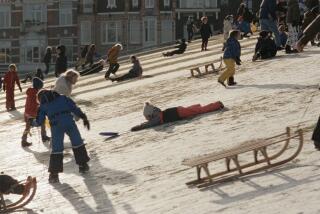Dutch Free 2 Jailed Nazis Who Deported Jews in WWII
- Share via
THE HAGUE — The two Nazi war criminals reported to be directly responsible for sending Anne Frank and her family to their deaths along with thousands of other Dutch Jews were freed from prison Friday and repatriated to West Germany.
The last surviving Nazi war criminals imprisoned since World War II were freed shortly after Parliament voted during an emergency session not to interfere with a plan to release them, Prime Minister Ruud Lubbers said.
Franz Fischer, 87, and Ferdinand aus der Fuenten, 80, were taken by ambulance to the Netherlands’ eastern frontier and handed over to West German authorities at the border.
Since the death of Hitler’s deputy, Rudolf Hess, in West Berlin in 1987, the two men have been in prison longer than any other Nazi war criminal.
Renee Sanders, a researcher with access to Dutch national war files who has spent two years researching the fate of the Frank family for a documentary, said Fischer and Aus der Fuenten were directly responsible for the family’s deportation to the Auschwitz death camp in Poland.
The Jewish Frank family managed to hide from the Nazi authorities in the attic of a Dutch family’s home in Amsterdam from 1942 until August, 1944.
The 16-year-old Anne Frank’s diary, describing vividly the period her family was forced to live cooped up in the attic, has become one of the world’s most famous testimonies of Nazi persecution.
“Aus der Fuenten headed the SS Jewish Emigration Center in Amsterdam,” Sanders said. “His subordinate, Karl Silberbauer, was the one who led the raid on the house in which the Franks were hiding.”
On the Last Train
The Frank family was sent to the Westerbork deportation center, and Sanders said Aus der Fuenten and Fischer ordered the last transport of Jews to Auschwitz from Westerbork on Sept. 3, 1944. Anne Frank and her family were on that last train.
Fischer and Aus der Fuenten were condemned to death at their trial in 1949 after they were found guilty of rounding up and deporting Jews from The Hague and Amsterdam to concentration camps. Their sentences later were commuted to life imprisonment.
Fischer was a sergeant major in the Nazi SS elite force and was found responsible for deporting 13,000 Jews from The Hague. Aus der Fuenten was an SS captain in Amsterdam, where he ran a bureau that organized the roundup and deportation of the city’s Jews.
Their release followed an emotional, two-day parliamentary debate. On Friday the legislators voted 85 to 55 to reject a Labor Party proposal that would have prevented the pair from being released.
The emergency session was hastily convened Thursday following widespread media and public criticism of the plan to release the two men.
During the debate, arguments for and against the release crossed party lines.
“I’ll never forget the faces of the Jewish children in the cattle wagons. That’s why I’m voting against the reprieve,” said Gerard van Leijenhorst, a member of the governing Christian Democrat party.
But Justice Minister Frederik Korthals Altes told Parliament that keeping the two men in prison would be a source of anguish for victims of Nazi atrocities.
“Further discussions about (the men’s) health will be a continual source of worry to war victims,” Korthals Altes said. He said the continued presence of the pair poisoned Dutch society.
“Let our society rid itself of the meager residue of the life the two still have in them and eradicate their symbolic function in our society with its endless source of grief and division,” he said.
“The proposal to release the two was not inspired by pity or mercy . . . . (But) their presence in our society has remained a poison,” he said.
Protest Against Release
There were demonstrations outside both Parliament and the Breda prison, where the two were being held, by protesters opposed to releasing the two war criminals.
Jewish leaders called for a demonstration Sunday at the yearly Auschwitz liberation memorial rally in Amsterdam.
“I tried everything to convince them this decision was wrong,” Rabbi Avraham Soetendorp said. “They have hurt many people.”
After the parliamentary vote, Aart Kliest, president of the Netherlands’ War Veteran Society, said he felt “sold out and abandoned by government and Parliament.”
The Dutch government previously tried to reprieve Fischer and Aus der Fuenten in 1972, but a public outcry prevented their release. A poll taken in 1988 showed that 70% of the Dutch public remained opposed to the plan.
More to Read
Sign up for Essential California
The most important California stories and recommendations in your inbox every morning.
You may occasionally receive promotional content from the Los Angeles Times.











